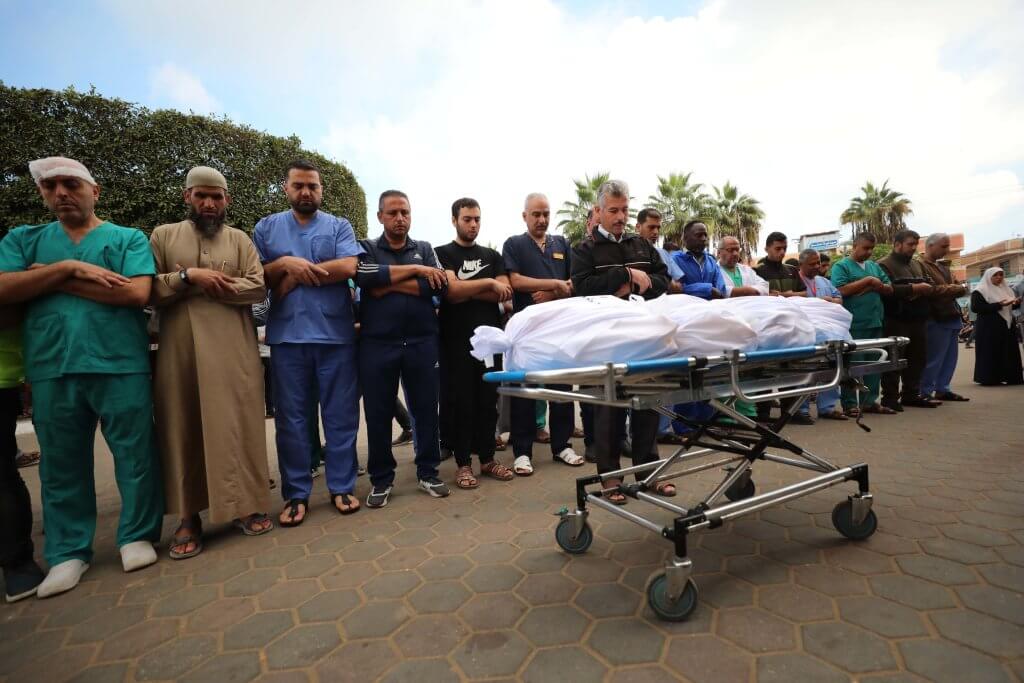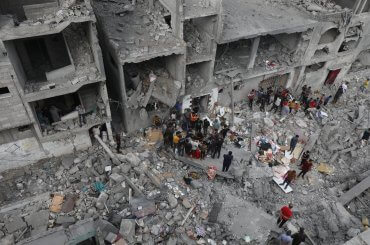Samah Hararah’s fate is uncertain.
“I aspired to graduate from medical school. But our university has been destroyed — its president and teachers martyred. Who will restore our dreams?”
His story is a regrettably familiar one. For months, Israel has bombarded Gaza — killing more than 32,600, the vast majority being women and children. Part of this assault is a relentless targeting of Gaza’s healthcare infrastructure, with disastrous results for medical students. Roughly 40 are dead, 60 have been arbitrarily arrested/detained, and thousands more have nowhere to study or train.
This is especially concerning as medical students are central to Gaza’s healthcare system. Students fill critical staffing voids in Gazan hospitals, helping deliver basic services to patients. Those voids are often the direct result of Israeli aggression which, since October 7, has killed nearly 500 healthcare workers.
Given the horrors of war, demand for medical services in Gaza is at a historic high. Meeting these needs will require not just rebuilding, but strengthening, Gaza’s crumbling healthcare infrastructure. To accomplish this big undertaking, Gazan medical students need adequate training and education. Only then can they blossom into the capable physicians their people so desperately need right now.
But domestic opportunities are virtually nonexistent. Israeli attacks have destroyed 53 of Gaza’s healthcare facilities and both of its medical schools. Gazan medical students are therefore looking elsewhere, with various philanthropic organizations helping them secure scholarships abroad.
The effort includes nonprofits in Palestine, the United States, and throughout Europe. So far, they are helping over 150 Gazan medical students continue their studies in other countries. Most have landed in Egypt, while others have found temporary homes in the Gulf, continental Europe, and even Central Asia.
Leaving home for wherever will take you is a common theme in the Palestinian experience. Palestinians historically are diasporic and remarkably adaptable people who follow opportunity and thrive wherever they find it. But they always remain connected to the homeland, either returning eventually or remotely supporting those who stayed.
That is the beauty of providing scholarships. As Dr. Rouba Ali-Fehmi — one of the initiative’s leaders — explains, it’s not just about helping students. It’s about producing the human capital necessary to serve the whole of Gazan society.
“By enabling these students to continue their medical education, we are investing in the future of healthcare in Gaza. We want to ensure that there will be skilled professionals ready to serve and rebuild this vital sector.”
The coalition is working around the clock to make that dream a reality. Members recently convinced more than four universities in neighboring Jordan and Egypt to open their doors to Gazan medical students. And they are currently lobbying schools in Qatar to do the same.
Universities throughout the Arab world have a long history of admitting Palestinian students. But the cost of tuition for Gazans specifically is often prohibitive. Even before the current humanitarian crisis, over 80% of them lived below the poverty line.
That is why scholarships are so important. They free poor students from the financial constraints that would otherwise render a medical education unattainable. As Razan Bhar, an aspiring surgeon from Gaza, explains:
“Outside universities should consider the destruction of Gaza’s economy and offer tuition discounts and scholarships.”
The initiative to help Gazan medical students continue their education is heartening. It provides a beacon of light in dark times. But we must understand it as a response to a preventable tragedy.
In a better world, Gazan students could study at home. Their local medical schools and healthcare facilities would be intact. They would enjoy the comfort and stability that their peers in the developed and even developing world take for granted.
That is what Gazan students deserve. Israeli oppression, enabled by unilateral American support, robs them of it. Overseas scholarships are great and necessary in this trying time. But a lasting, just resolution for Gazan medical students requires an indefinite ceasefire. It requires an end to the Israeli occupation and apartheid that limits their immense potential.
In the meantime, scholarship funds help guarantee the human capital Gaza needs to rise from the rubble and rebuild. The organizations doing this important work — from NAAMA and NAAMA NextGen, to Rebuild Gaza Health Sector Infrastructure, Al Quds Foundation for Medical Students in Palestine (FQMS), Biomedics UK, and the KIT Royal Institute in the Netherlands — are accepting donations. So is PalMed Academy, a European initiative to deliver online education to medical students who remain in Gaza. Even a small contribution could make a big difference in the lives of Gazans for generations to come.



Regarding Gaza’s healthcare system, late in March the Journal of Public Health and Emergency ( an open access journal for emergency and public healthcare ) published a letter to the editor signed by 17 healthcare professionals ( including Alice Rothchild, who has written articles for Mondoweiss ):
On the duty to protect the people of Gaza: how the collapse of the hospital health care system has reinforced genocidal intent…As of January 20, 2024, of 36 functional hospitals in Gaza, only three were still fully operational….The attacks on health care facilities are both forbidden according to international humanitarian law and the laws of war. These assaults affect the entire civilian population, leaving them unable to attend to their basic needs for survival, inflicting “collective punishment”. These attacks are considered genocidal because the deprivation is directed towards an entire ethnically, religiously defined population and because of the expressed intent and design to destroy or displace it (9)….The wide efforts to disable and destroy once and for ever the health care system since the beginning of this Israeli assault, by intentional destruction whole or in part of structures, targeted attacks to personnel into the wards, killings, and arrests of personnel are unambiguous examples of the genocidal policies…. The rapid destruction by Israeli forces of the alleged “proof” that Hamas and militant factions were operating within or adjacent to hospitals, leaves as the only proof that provided by the self-produced Israel Defense Forces (IDF) videos and erases the opportunity to test the validity of Israeli claims.
https://jphe.amegroups.org/article/view/9883/pdf
now this is something i can get behind
have been in evacuation hospitals in a bed next to…that is sort of MASH in the 60s 70s equivalent where they have brought in Viet Cong and NVA mashed up who were treated equivalent of US soldiers…that’s for those in USA who thought we insensitive…we were not back then…
these unfortunate people do need help…this attack on hospitals and medical care is abominable…
I do not know what has happened to morality and the sense of humanity in America….